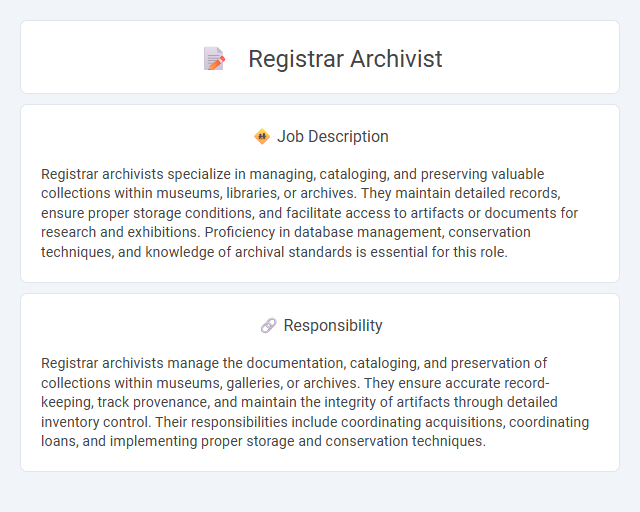
Registrar archivists specialize in managing, cataloging, and preserving valuable collections within museums, libraries, or archives. They maintain detailed records, ensure proper storage conditions, and facilitate access to artifacts or documents for research and exhibitions. Proficiency in database management, conservation techniques, and knowledge of archival standards is essential for this role.
Individuals with strong organizational skills and a keen attention to detail are likely to be well-suited for a Registrar Archivist role. Those who thrive in structured environments and enjoy meticulous record-keeping may find this job fulfilling. People who prefer dynamic, fast-paced work might find the routine and precision required less compatible with their strengths.
Qualification
A Registrar archivist typically requires a bachelor's degree in history, library science, archival studies, or a related field, with many positions favoring a master's degree or specialized certification such as the Certified Archivist credential. Strong organizational skills, attention to detail, and proficiency in digital archiving software and database management are essential qualifications. Experience in cataloging, records management, and knowledge of preservation techniques further enhances a candidate's suitability for the role.
Responsibility
Registrar archivists manage the documentation, cataloging, and preservation of collections within museums, galleries, or archives. They ensure accurate record-keeping, track provenance, and maintain the integrity of artifacts through detailed inventory control. Their responsibilities include coordinating acquisitions, coordinating loans, and implementing proper storage and conservation techniques.
Benefit
A Registrar Archivist job likely offers significant benefits such as gaining expertise in managing valuable historical documents and collections, which may enhance career advancement opportunities. Employees in this role probably enjoy access to unique archives and cultural resources, fostering professional growth and specialized knowledge. The position might also provide a stable work environment with potential for involvement in preservation projects and institutional collaborations.
Challenge
The role of a registrar archivist likely presents challenges involving meticulous organization and preservation of vast, diverse collections under tight deadlines. Balancing the need for accessibility with strict conservation protocols may require constant problem-solving and adaptability. Navigating complex legal and ethical standards around acquisition and documentation possibly adds to the job's demanding nature.
Career Advancement
Registrar archivist careers offer significant advancement opportunities through developing expertise in collection management, preservation techniques, and digital archiving. Professionals can progress to senior archivist roles, museum curatorships, or manage large institutional archives, leveraging skills in cataloging, acquisition, and metadata standards. Advanced certification and continuous training in archival science and information technology enhance prospects for leadership positions within cultural heritage organizations.
 kuljobs.com
kuljobs.com